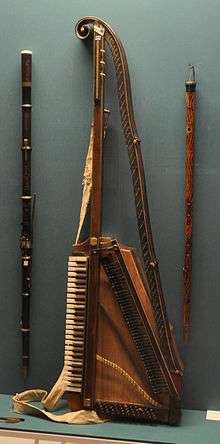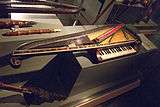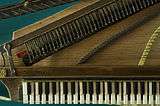Orphica

Orphica by Joseph Dohnal (Kunsthistorisches Museum)
The orphica is a portable piano invented by Carl Leopold Röllig in the late 18th century. Like a guitar, the orphica could be held on a shoulder strap, thus being an early forerunner of the modern keytar.[1]
Only a few orphicas were made in Vienna from 1795 to 1810; about 30 orphicas are still in existence today.
Beethoven's compositions for orphica
Among the few composers writing for the orphica was Ludwig van Beethoven. According to a letter of Beethoven's friend Franz Gerhard Wegeler from December 23, 1827, Wegeler had 2 Stückchen für die Orphica, die Bhven für meine Frau componirte ('2 small pieces for the orphica which Beethoven composed for my wife').[2] This refers to the two pieces of 1798, WoO. 51, formerly erroneously titled Leichte Klaviersonate.
Gallery
- An orphica at the Museo Nazionale degli Strumenti Musicali di Roma

 Details of Orphica (Kunsthistorisches Museum)
Details of Orphica (Kunsthistorisches Museum)
References
Literature
- Carl Leopold Röllig, Orphica. Ein musikalisches Instrument. Erfunden von C. L. Röllig, Vienna 1795
- Benjamin Vogel, Orphicas, Genuin, Less Genuin and Fakes, in: The Galpin Society Journal, Nr. 57 (May 2004), pp. 19–45 and 204–205
- Andreas Beurmann, Das Buch vom Klavier. Die Sammlung Beurmann im Museum für Kunst und Gewerbe in Hamburg und auf Gut Hasselburg in Ostholstein, 2008
- Klaus Martin Kopitz, Beethoven as a Composer for the Orphica: A New Source for WoO 51, in: The Beethoven Journal, vol. 22, Nr. 1 (Summer 2007), pp. 25–30 (PDF)
External links

- Metropolitan Museum of Art
This article is issued from
Wikipedia.
The text is licensed under Creative Commons - Attribution - Sharealike.
Additional terms may apply for the media files.